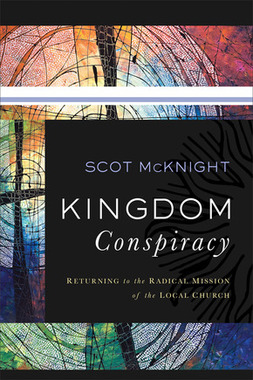posts
 I was grateful to read McKnight’s latest book as I enjoy his biblical scholarship and his very engaging and often fun writing style. In this work, he aims to offer fresh insights to our understanding of the kingdom of God, particularly for a younger generation that seems committed to “kingdom mission” but not necessarily the mission of the church. He succeeds in arguing that there shouldn’t be a false dichotomy between kingdom and church and invites the reader into a renewed love for the church. If I could take Scott McKnight to dinner at Gino’s East or his favorite deep-dish establishment in Chicagoland, this is what I would want to talk about, beginning with some critiques and then some affirmations. First, in the opening chapters, McKnight discusses the skinny jeans and pleated pants generations. The latter tend to see the kingdom as more soterion and spiritually oriented; while the former seem more excited about good works and the “greater good” regardless of whether the gospel is proclaimed. This dichotomy seems a bit overstated and is largely located within the evangelical church in North America. Yes, millenials, GenXers, and boomers in North America have thought about the kingdom in light of their concerns and times. But what about the perspectives of Latin American, African, and Asian theologians thinking about the kingdom amid political instability, HIV/AIDS, tribalism, civil war, and hunger? I think these global perspectives would have enriched the discussion greatly. Second, while I resonate with McKnight’s celebration of and love for the church in light of the kingdom, his conclusion that “it is reasonable to say that the kingdom is the church, and the church is the kingdom” (p. 206) seems to go too far. In chapters 6 and 7, he argues toward an integral relationship between the kingdom and the church but in his final chapter (“kingdom theses”), he equivocates the two with this statement. Throughout the book, McKnight converses with George Eldon Ladd’s kingdom theology (the apparent official representative of pleaded pants theology) but he clearly breaks with Ladd with this last claim. Contra McKnight, I would affirm with Ladd that “the church is not the kingdom; it is only the people of the kingdom . . . the church witnesses to the kingdom through proclaiming God’s redeeming acts in Christ . . . the church is the instrument of the kingdom [and] . . . the church is the custodian of the kingdom through its proclamation of the gospel throughout the world” (cited in Glasser 2003:226). On the positive side, McKnight rightly argues that the kingdom is shaped by the values, ways, and teachings of its King Jesus. Thus, kingdom work does not include the benevolent, “greater good” actions of those who do not follow Christ. Though noble, Gandhi’s work should not be deemed kingdom work. McKnight’s lifelong conviction to think and believe biblically—a strong impetus for this book—comes shining through here. I also really liked McKnight’s assertions about kingdom living in chapter 10. That is, because of the kingdom—in the now and because of the not yet—believers “are marked by industry, by intention, by simplicity, by wisdom, and most especially by generosity” (p. 178). I was especially challenged and moved by McKnight’s admonition to pursue deeper fellowship with other members of Christ’s body. The most impactful chapter of the book for me was chapter 11 where McKnight expounded on kingdom hope. As I read (too much good stuff to summarize; just read it), I longed to sit in the presence of the Lord at his banqueting table and to live in a place where there is “justice and the end of injustice, provision for the poor and the end of impoverishment as well as rich exploitation, the end of foreign rule and the establishment of divine home rule, forgiveness of sins and a people marked by holiness and worship of the one true God . . . and peace” (p. 192). This future hope leads me to pray more fervently “your kingdom come, your will be done on earth at is in heaven,” to act and live in anticipation of the coming kingdom, and to persevere in global mission because of this kingdom hope. Thank you Scott McKnight and I hope we’ll have that pizza someday. Comments are closed.
|
Archives
November 2023
|
 RSS Feed
RSS Feed
